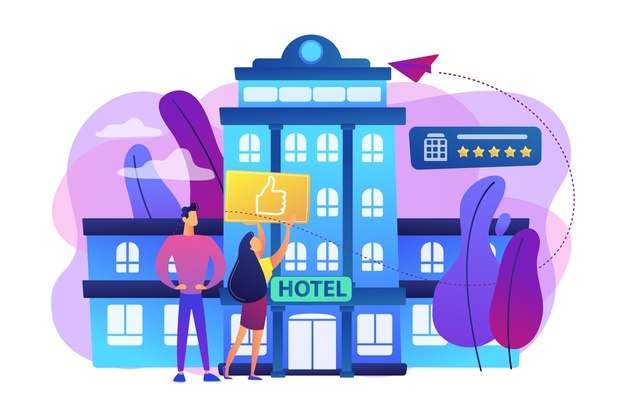10 Hotel Trends Every Business Should Follow in 2021-22

Mention far-and-wide disruptions and the Hotel industry easily come to mind. No aspect of the industry is left untouched by the COVID-19 pandemic, save for the basic principles of hospitality. Safe to say, today’s business models in the sector look like entirely different animals from their predecessors and there are many more hospitality trends, which you’ll find out below.
As a business owner, keeping an eye out for the latest trends can help you stay on top of all the changes in the industry, events that impact how you do business. In this hospitality trends report, we will delve into the latest and most significant developments that are reshaping guest experience, tech adoption, and tourism, among others.
As 2021 unfolds, we can expect to see trends that emerge as direct reactions and adjustments to the continued spread of the virus. For example, hotels and accommodation rentals have already implemented stricter hygiene protocols, increased cleaning at all locations, converted rooms to work-friendly rooms with wifi and practical workstations, and some have invested in touchless technology and mobile apps to reduce the spread of the virus (Global Data, 2021).
With the hospitality industry’s diversity comes a wide array of trends that you, as a business owner, should consider when developing your strategies to stay on top of the game. In the following sections, we will go through some of the trends shaping today’s modernized hospitality industry.
1. Online Communities
Concerning the hospitality industry, online communities changed the way businesses in the hospitality field interact with customers. Company websites, social media networks, and travel websites like TripAdvisor contribute to hospitality facilities’ take on transparency, leading to an improvement in the quality of services they offer.
Online marketing also heavily relies on multi-user interactivity. Hence, reviews found on the internet heavily affect a customer’s booking decisions. Word-of-mouth remains a powerful marketing tool, and combined with today’s digital platforms; customers can easily share their experiences in hospitality facilities. For business owners, this means they can easily find unique selling points.
Needless to say, positive reviews convert to economic value for your business. Potential guests are more likely to rely more on the reviews made by current or previous hotel customers. Moreover, the information you can extract from online communities, like the reviewers’ age, lifestyle, job, gender, and hobbies, will give you valuable insights. This way, you get updated with the current trends in competition and the upgrades you need to deliver better services.
2. Sharing Economy
The sharing economy is way past the experimental stage in the hospitality industry. It has been redefining the industry and is expected to grow in the coming years. Derived from the notion that mutual parties can share an unused asset or property, the sharing economy leverages technology to facilitate value exchanges. This could be through peer-to-peer applications, collaborative platforms, or shared marketplaces.
In the sharing economy, you can easily coordinate transactions via the internet. Although this occurs among private individuals, it has nonetheless created an economic impact for major and leading brands in distinctive industries. Airbnb, Expedia, and other sharing economy platforms are currently providing new hospitality experiences for customers.
Also visit This Page: Best Accounting Software India
3. Voice search
Voice search is the current trend that cuts across different industries. Technology, after all, tends to be limitless in capabilities. Amazon’s Alexa, Apple’s Siri, Google Assistant, and Microsoft’s Cortana are the latest digital assistant technologies on the rise.
Though many consider this AI to be in its early stages of development, the model is based on conversational language. It aims to understand the intent and context based on previous queries. Furthermore, it wants to achieve perfection in contemplating multiple steps and queries, with more focus on actions, tasks, and transactions.
In the hospitality industry, voice search is increasingly transforming the booking process. Via smartphones and tablets, customers can now research and book their holidays. By equipping your website with voice search capabilities, you can increase conversions as it connects you to qualified leads.
4. Sustainability
As we face more environmental issues each day, sustainability becomes a primary concern. Thus, a large section of the hospitality industry participates in Go Green acts to lessen negative environmental impact. This proved good for the planet and also for businesses. It brings and attracts more hotel guests. Also, customers are more willing to pay for products and services from companies with sustainability practices.
In the last 10 years, hoteliers applied sustainability practices to their properties. This granted a significant impact on the environment, enhanced guest experience, and drove overall revenue.
Constantly developing environmental technologies reduces costs for hotels and improves efficiency. Governments have also started giving out economic incentives for the construction of properties that incorporate green technology. These incentives range from tax write-offs, expedited regulatory permitting, financial grants, and premium discounts for insurance.
5. Virtual Reality
Virtual reality (VR) transformed and enriched the hospitality industry. It is one of today’s biggest emerging technology trends, with 57.4 million users in the United States alone (eMarketer, 2020). Thus, many businesses incorporate VR for the various opportunities it creates. VR in the hospitality industry is applied in travel experiences, hotel tours, and booking processes.
High-quality VR headsets are now a mainstream consumer product, thanks to the increased investments from the likes of Samsung, Facebook, and Google. Along with augmented reality, VR allows customers to virtually experience a recreation of a hotel room or explore nearby attractions.
In recent years, VR enhanced customer experience when exploring the surrounding area. For an average customer, VR provides more accurate information related to booking a hotel room. Reading through descriptions pales in comparison to VR, which offers customers the opportunity to virtually experience things for themselves. This way, hotels benefit from the try-before-you-buy concept of marketing.
6. Mobile Technology
Hotels and resorts are now leveraging mobile platforms for their guest loyalty, company branding, advertising, cross-selling, and marketing programs. Mobile apps are now a must-have for hotels and other related businesses. Various hotel management software is also available on the market today.
Mobile apps in the hospitality industry have been tested and proven to deliver excellent customer experience. Mobile-friendly websites and apps, as well as live and updated information, drive growth in the overall business. Moreover, mobile technology bridges the gap between the customer and the hotel itself.
Studies reveal that there is a steady rise in guest preferences for mobile apps related to the hospitality industry. Mobile technology, more specifically mobile marketing software, revolutionized the presentation of guest services through high-quality images and videos. Moreover, exposure and usage can increase for hotels when their facilities such as in-room dining, concierge, or other travel services are presented in high-quality multimedia formats.
In 2020, 274.7 million people in the United States accessed the internet through any kind of mobile device. In 2023, this figure is projected to amount to over 295 million mobile internet users. Currently, approximately 83% of the US population are mobile internet users.
7. Personalized Guest Experience
The struggle to attract, convert, and retain customers is always present in the hospitality industry. Personalization of services is the latest development to transform the hospitality sector. Thus, going after a personalized guest experience has become a powerful and transforming trend in the hospitality business.
With the diversity of the hospitality industry, the personalization of services was not possible until recently. Capturing and using guest data for more relevant engagement can be a complicated task. But once done, hotels realize it is well worth the effort.
Guest data can be used to provide a personalized experience for your customers. It helps you anticipate their needs, send them relevant and related offers, and customize their stay in your property. By using data analytics software available today. This can be done by tracking and analyzing customer behavior and trends across multiple hotel properties. AI technology can also help you develop targeted and relevant sales and marketing materials differentiated for specific individuals or groups.
Studies reveal that customer experience can soon overtake price and product as a key brand differentiator. Thus, it is now more necessary for hotels and other related businesses in the hospitality sector to deliver satisfactory services.
8. A New Generation of Travelers
While reports vary on traveler characteristics and demographics, they all agree on one thing: the new generation is leading the pack in shaping the industry. Likewise, for hospitality businesses around the world, change is the new norm. To keep the business stable, developments must be made to attract this new generation of travelers.
Industry leaders now carry the burden of understanding this new generation’s characters and preferences, which seemed to have changed rapidly, from Millenials and now to the so-called Generation Z. According to several reports, Generation Z is about to take over Millennials in population numbers and their estimated buying power.
According to Forbes, the Gen Z buying power in direct spending is from $29 billion to $143 billion. With this, youth travel also becomes the fastest-growing sector in tourism. Hence, the market sees the need to apply tremendous changes based on the new generation’s likes and dislikes.
However, with the current state of the pandemic, many travelers of all ages are currently opting out of traveling in the near future to avoid the risk of contracting the virus. But this trend is sure to resume as the coronavirus vaccines roll out in 2021 and as travel restrictions become more relaxed.
9. Global Tourism
In the past years, the rising global tourism fueled the growth of the hospitality space. But that has changed since COVID-19 wrought havoc in 2020. Now, the industry is facing the risk of direct job losses of as many as 100 million (UNWTO, 2020). In the US, travel spending in 2020 only amounted to $679 billion—”an unprecedented 42% annual decline (nearly $500 billion) from 2019,” (US Travel Association, 2021).
As countries start lifting travel restrictions and with hope spreading with the rollout of vaccines, we can expect the tourism industry to benefit from the “revenge spending” spree that many consumers will undertake. The industry will see a revival as customers start spending on things they have been denied during the lockdowns such as travel, dining-in at restaurants, and in-person entertainment (US Travel Association, 2021). Of course, coordinated health protocols will still be in place to protect both travelers and workers.
10. The Advent of Unique Tourism Products
Unique tourism products provide physical and psychological satisfaction to travelers, especially for those who are looking for more unique experiences. Some examples include sports tourism, health tourism, and more. These products allow travelers to choose specific destinations and the things that they expect to do when they get there.
This trend brings to the industry several opportunities to expand a particular business. However, unlike the usual travel types, these products cannot be forced upon a traveler. In most cases, the traveler must be the one to seek it. This is why it requires in-depth studies on customer behavior, preferences, and expectations. Another thing to consider in this trend is its tendency to have an unstable demand. Seasonal, economic, political, and other factors greatly influence some tourism products. Take, for example, safari tourism that is dependent on seasons when game viewing is at its best. This reflects that some tourism products see higher demand than others at certain times of the year.
Apart from this if you are interested to know about Improve Your Hotel’s Online Visibility then visit our Business category.





